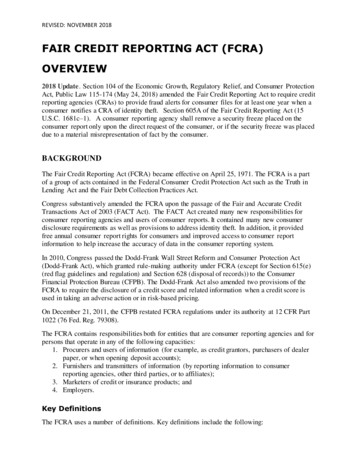
Transcription
Terms of AgreementA Consumer Guide toHome Improvement ContractsCONTRACTORS STATELICENSE BOARDCalifornia Department of Consumer Affairs1
Members of the Contractors State License BoardDavid De La Torre, Public MemberSusan Granzella, Public MemberMary Teichert, (A) General Engineering ContractorKevin J. Albanese, (B) Contractor MemberFrank Altamura, Jr., Public MemberAgustin “Augie” Beltran, Public MemberRodney M. Cobos, Public MemberMiguel Galarza, (B) Contractor MemberDonald Giarratano, (C) Contractor MemberDiana Love, Senior Citizen Organization MemberMichael Mark, Labor Organization MemberMarlo Richardson, Public MemberJames Ruane, (C) Specialty Contractor MemberJohnny Simpson, Public MemberNancy Springer, Building Official MemberGavin NewsomGovernorLourdes M. Castro RamírezSecretary, Business, Consumer Services andHousing AgencyKimberly KirchmeyerDirector, Department of Consumer AffairsDavid R. FogtRegistrar, Contractors State License Board 2021, CALIFORNIA CONTRACTORS STATE LICENSE BOARD2
AC O N S U M E RG U I D E TOH O M EI M P R OV E M E NTC O NT R AC T SIn California, the terms of all home improvement projects over 500 (combined material and labor costs) must be in a contractand include specific information about your consumer rights andresponsibilities.What is “Home Improvement?”“Home improvement” essentially is any change you make to theinterior or exterior of your residence or property. It includes:“ the repairing, remodeling, altering, converting, ormodernizing of, or adding to, real or residential propertyand shall include, but not be limited to, the construction,erection, replacement, or improvement of driveways,swimming pools, including spas and hot tubs, terraces,patios, awnings, storm windows, landscaping, fences,porches, garages, fallout shelters, basements, and otherimprovements of the structures or land which is adjacentto a dwelling house. Home improvement shall alsomean the installation of home improvement goods orthe furnishing of home improvement services. (Businessand Professions Code section 7151)What is a Home Improvement Contractand When Do I Need One?A home improvement contract is an agreement between acontractor and a property owner or between a contractor and atenant, and includes in its description all labor, services, andmaterials to be furnished and performed. A home improvementcontract also can mean an agreement between a salesperson (homeimprovement salesperson) and property/home owner or tenant.(Business and Professions Code section 7151.2)This contract is the most important communication tool betweenyou and your contractor; it should identify all project expectationsto help avoid misunderstandings.3
T E R M SO FAG R E E M E NTA thorough contract details who will do the work, what materialswill be used, where the work will be done, when it will be done,and how much it will cost.Your home improvement contract always should be in writing,legible, easy to understand, and inform you of the right to cancel orrescind the contract. If you are promised something verbally, makesure that it also is included in writing. Any changes to the contractneed to be in writing, as well. These “change orders” should be keptwith your other project paperwork.Anatomy of a ContractA contract should contain all project details agreed upon by youand your contractor. Among the details should be a description ofthe work, price, payment schedule, who will pull necessary buildingdepartment permits, and when the job will begin and end. Thecontractor’s state license number, address, and phone number(s)also should be listed.Don’t sign anything until youunderstand the contract andagree to the terms.The Sign of a Well-Built Contract –Describe EverythingThe best way to avoid disputes over what is or isn’t expected from ahome improvement job is to include all of the details into a written,signed contract.The contract should be as specific as possible regarding all materialsto be used, such as the style, brand, model, quality, quantity,weight, color, size, or any other description that may apply.For example: “Install upper and lower maple kitchen cabinets,manufactured by Company XYZ, model 01381A, style/color0123, hinge and hardware selection, as per the plan dimensionsand diagram,” not just “install kitchen cabinets.”4
AC O N S U M E RG U I D E TOH O M EI M P R OV E M E NTC O NT R AC T SWILL YOUR PROJECT DESCRIPTIONGIVE YOU THE RIGHT RESULTS?GOOD EXPECTATIONSInstall xx (quantity) Company XYZupper/lower maple kitchen cabinets,model ABC, style/color 0123, Europeanhinges, hardware model 1000, per plandimensions and diagram.Paint indoor entry (per plan) usingBrand X paint, color 567, two coats, withpreparation and taping described innext paragraph.Install Brand X kitchen faucet in styleABC and color BCS.TROUBLEAHEADGOOD LUCKInstall maplekitchencabinets.Install somecabinets.Prep and paintentryway withblue paint.Paint the entry.Replace kitchenReplace kitchenfaucet, iffixtures.necessary.Swimming pool contracts must include a plan and scale drawingshowing the shape, size/dimensions, and construction and equipmentspecifications.Make sure the contract includes everything that is agreed to, up toand including complete cleanup and removal of debris and materials,and special requests like saving lumber for firewood or savingcertain materials or appliances.Complaints and WarrantiesIf the contractor offers a warranty for labor and/or materials, besure to get that in writing. It should specify which parts of thework are covered and the duration of the warranty. You also shouldrequest any written warranties offered by the manufacturers ofmaterials or appliances that are installed by the contractor.Consumers have four (4) years to file a complaint with the ContractorsState License Board (CSLB) about a faulty project. That deadlinecan be extended if additional warranties are written into the contract.5
T E R M SO FAG R E E M E NTMoney – The Bottom LinePrice – All contracts must include the agreed-to price. Any jobcosting 500 or more (combined material and labor) needs awritten home improvement contract. By law, the job must becompleted for the agreed-upon contract price.If the contract price needs to be changed, it MUST be done witha written change order that becomes a part of the contract.Down Payment – If the contract calls for a down payment beforework starts, the down payment cannot be more than 1,000 or10 percent of the contract price, whichever is less, for a homeimprovement job or swimming pool, excluding finance charges.There are no exceptions for special order materials. There is adown payment exception for about two dozen licensees who carryspecial bonds to protect consumers, known as blanket performanceand payment bonds. These exceptions are noted on CSLB’s website.Schedule of Payments – A home improvement contract mustinclude a payment schedule. It should show the amount of eachpayment and explain what work, materials or services are to beperformed for that particular payment. Payments to the contractorcannot exceed the value of the performed work.Swimming Pools – A final swimming pool contractpayment may be made at the completion of the finalplastering phase of construction (provided that anyinstallation of equipment, decking, or fencing requiredby the contract also is completed).Finance Charges – If applicable, finance charges must be calculatedand laid out in detail, separate from the contract amount.Sales Commission – If the contract provides for payment ofa salesperson’s commission as part of the contract price, thatpayment must be made on a pro rata basis in proportion to theschedule of payments made to the contractor.Salespersons – A salesperson cannot legally sign a homeimprovement contract for the contractor unless he or she is avalid, CSLB-registered home improvement salesperson (HIS).6
AC O N S U M E RG U I D E TOH O M EI M P R OV E M E NTC O NT R AC T SMechanics LiensConsumers are required to receive a “Notice to Owner” warningabout property liens. Anyone who helps improve property, butis not paid, may place what is called a mechanics lien on theproperty. A mechanics lien is a claim made against the propertyby the person who was not paid, and is recorded with the county.Even if the contractor is paid in full, unpaid subcontractors, suppliers,and laborers involved in the project may record a mechanics lienand sue the property owner in court to foreclose the lien. A propertyowner could be forced to pay twice or have the court sell the hometo pay the lien. Liens also can affect a consumer’s personal creditrating, and affect his or her ability to borrow and refinance.Consumers can protect themselves from liens by getting a list fromthe contractor of all subcontractors and material suppliers who willwork on the project, along with the dates they will start and finishthe work. Material suppliers and subcontractors are required to givethe property owner a “Preliminary Notice” of their right to file alien within 20 days of delivering products/materials or 20 days ofbeginning the work. Have subcontractors sign lien releases whentheir portion of the work is completed.Another option for consumers is to pay with a joint check that ispayable to both the contractor and the subcontractor or materialsupplier.For more information on thissubject, go to www.cslb.ca.govand search for “mechanics liens.”7
T E R M SO FAG R E E M E NTCanceling the ContractRight to CancelThe Home Solicitation Sales Act requires a seller of home goods orservices to give the buyer three (3) business days (or five businessdays if the buyer is 65 or older) to think about whether to buy theoffered goods or services.To cancel, the buyer need only give the contractor written notice ofhis or her intent not to be bound by the contract—there is no penaltyor obligation on the part of the buyer. Under state law, when thecontract is canceled, the seller is required to return any money thatwas paid within 10 days of receiving the cancellation request. Theconsumer/buyer must return any materials to the contractor thatwere applied to the contract.The purpose of the right to cancel is to protect consumers from thepressure they often feel from in-home solicitors.If the contract is negotiated at the contractor’s place of business,the three- or five-day right to cancel does not apply.The Contract ExceptionService and Repair ContractsOne major exception to the three- or five-day right to cancel isa “service and repair” contract that covers emergency repairs orservices that are requested by the consumer on short notice. Theright to a cancelation notice is automatically voided the momentthe contract is signed and the contractor begins working on aservice and repair contract.8
AC O N S U M E RG U I D E TOH O M EI M P R OV E M E NTC O NT R AC T SBuilding PermitsA construction or building permit is a required document inmost jurisdictions for a large range of project types, includingnew construction or adding to pre-existing structures, majorrenovations, heating and air-conditioning repairs, and installationof water heaters and swimming pools. Permits are issued by thelocal building department. Generally, the new construction mustbe inspected during construction and after completion to ensurecompliance with national, regional, and local building codes.Failure to obtain a permit can result in significant fines andpenalties, and even demolition of unauthorized construction if itdoes not meet code requirements.A Word About InsuranceDoes your contractor have employees? Workers’ compensationinsurance is required by law if the contractor has employeesor workers. Check the CSLB website, www.cslb.ca.gov orwww.CheckTheLicenseFirst.com to make sure the workers’comp policy is current.Although not required, it’s also a good idea to ask whether thecontractor carries general liability insurance in case your propertyaccidentally is damaged during the project. You might considercontacting your homeowner insurance carrier to find out if it wouldbe advisable to take out a temporary “rider” to your insurancepolicy, which is extended coverage for a determined period oftime or for a particular use.9
HOMEOWNER CHECKLISTCHECK OUT YOUR CONTRACTORDid you contact the Contractors State License Board (CSLB) to check thestatus of the contractor’s license? Connect with CSLB at 800.321.CSLB(2752), www.cslb.ca.gov or www.CheckTheLicenseFirst.com.Did you get at least three local references from the contractors youare considering?Did you call the references and personally view the contractor’scompleted work?Does the contractor carry general liability insurance?BUILDING PERMITSDoes your contract state whether you or your contractor will pull necessarybuilding permits before the work starts?Are the permit fees included in the contract price?DOUBLE-CHECK THE CONTRACTDid you read and understand your contract?Does the three- or five-day right to cancel a contract apply to you?Does the contract identify when work will begin and end?Does the contract include a detailed description of the work to be done,the materials to be used, and/or equipment to be installed?Are you required to make a down payment? (The down payment shouldnever be more than 10 percent of the contract price or 1,000, whicheveris less, unless there is a valid blanket performance and payment bond onfile with CSLB.)Is there a schedule of payments? (Only pay as work is completed,not before).Did your contractor give you a “Notice to Owner” warning notice thatdescribes mechanics liens and how to prevent them?Do you have changes or additions to your contract? (Rememberthat all changes must be in writing and signed by both parties toavoid disagreements.)10w w w. c s l b . c a . g o v
NOTES
CONTRACTORS STATE LICENSE BOARDP.O. Box 26000Sacramento, CA 95826-0026800.321.CSLB (2752)www.cslb.ca.gov CheckTheLicenseFirst.com13P-045/012112 SeniorScamStopper.com
A home improvement contract is an agreement between a contractor and a property owner or between a contractor and a tenant, and includes in its description all labor, services, and materials to be furnished and performed. A home improvement contract also can mean an agreement between a salesperson (home











